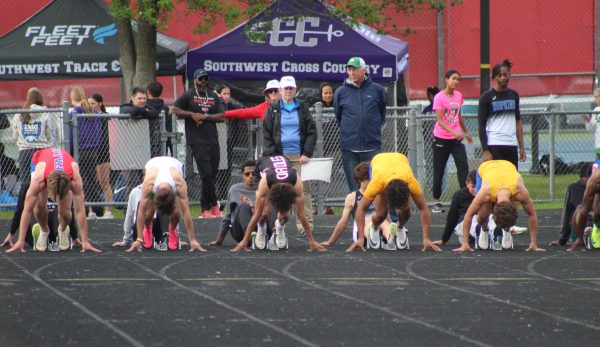To quit or not to quit
Inside an athlete’s mind
February 23, 2023
An athlete’s dreaded nightmare is the proposed question: To quit or not to quit? This question is not an easy one but one that many athletes, no matter how accomplished or decorated, are faced with. The strength it takes to come to a decision on whether or not to end a chapter of one’s athletic career is utterly immeasurable. It is hard to understand that, despite the hours, training, money and effort — sacrificing one’s social life and competing past one’s fear and injury — it could all be over. One can go back-and-forth, tiring oneself and thinking of all of the what-ifs, and someone will say, “Just quit.” When someone fails to recognize the complexity of an athlete’s mind and experience, they think this is an easy decision — an answer one knows in an instant. However, it is so much more than that.
I have been a competitive athlete throughout my entire life. Starting sports at a young age, I found myself learning discipline and testing my limits early on. When one is young, they have their whole career ahead of them, but as they get older and have more experience, the clock seemingly starts ticking down to become someone greater. When I was younger, I enjoyed sports for what they were. Now, I have so many barriers and hoops to jump through to maintain my love for a sport when it once came easily.
The first reason I have found that I and many athletes debate quitting has to do with coaching. Coaching is one of the biggest aspects of a sport. When I was a novice, I found that an athlete-coach relationship is dependent on trust and respect. I valued someone who instilled confidence in me, encouraged me to try my best and pushed me to become better — all while maintaining a positive atmosphere.
When I moved to a different team, however, I was shocked when all of my teammates warned me about my coach, telling me that she would not listen to the athletes, force them to compete through injuries, dismiss their concerns about a lack of improvement and destroy the girls’ confidence in themselves and their sport by speaking about them behind their backs. I found this to be true and soon realized that a bad coach can destroy one’s relationship with themself and their sport. It’s hard to be expected to watch as training and games turn into a chore because the person responsible for helping one get better holds them back.
Another reason an athlete may quit their sport is the pressure to become better. I put a lot of time into my sports and am a perfectionist. I try hard to become the best I can be. Sometimes, no matter how hard one tries, they are not always where they want to be. When I was in that position, it became easier for me to compare myself to other athletes and convince myself I would never be as successful as I hoped. One’s performances feel like an accurate representation of them, and failure is hard to be motivated by. Every time one doesn’t succeed, it takes something from them. Anticipating every move one makes in a game or beating oneself up over bad performances can make someone lose sight of why they first joined the sport. It goes without saying that sports are hard without confidence.
Next is the stigma that one is only good if they commit to a college. If one isn’t on-track for DI, D2 or even D3, athletics may feel like they are running themselves into the ground. One is trying so hard to only be done when they are in college. Though this should not discourage young athletes, as being a part of a sport helps form friendships, have fun and stay active, for some, it is believed that the only way to be considered good is if colleges are looking at or showing interest in one’s performances. I constantly am asked if I am looking at doing sports after high school. When I say that I do a certain sport, I am always asked, “Are any colleges looking at you?” It is hard to be motivated when people only see you as not being a college prospect.
Finally, injuries are another reason many quit. Injuries are a part of every sport and one of the hardest things an athlete is faced with. Athletes work so hard and put their bodies under tremendous stress. Being injured takes valuable time — time for training. When I was told I had a stress fracture in my back, I felt as if my world had shattered. The plans I had made for myself were put on pause. Being on a break is something that messes with an athlete’s mind because getting out on the field or in the gym is reassurance. Watching everyone else get to work is harder than most believe, and one just wants to be out there doing what they love. Coming back from an injury not only takes a lot of physical strength, but mental strength also. Sometimes, one’s body cannot take the sport anymore, and no matter how hard they plead, returning is not in the cards.
For these reasons and many more, people are faced with the question: To quit or not to quit? It is a difficult decision to make. It is one that I, certainly, have thought over many sleepless nights, draining practices, and tiring competitions. It is hard when the sport is all one’s ever known and one that they have made your life. So, when faced with this choice, do we really have a choice at all?














